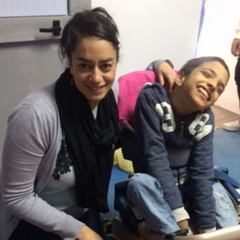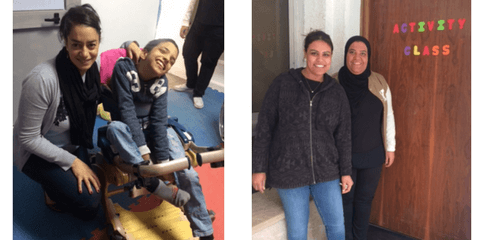
How Children with Special Needs are Treated in Egypt
My trips to Egypt are not regular. Often, visits are anything from 2-3 years. However, they are often the same….making the usual rounds of visiting family and friends with the occasional tourist site visits. This trip was different. I come from a large family that extends further than I could ever manage to visit in one trip.
I have known for almost all my adult life that I had an aunt that no one wanted to talk about. So in a recent trip to Egypt I was on a mission to find out what happened to her. So little was known around the time she was born in the late 1930’s. The difficulty I faced was finding a family member still alive that was willing to talk about it. I had to choose carefully the right relative to ask that would open up. I had no idea how my questioning would be received. I began with extended family in Cairo, and slowly making my way to Cairo before I could ask the right family member for all the answers I needed. Along the way I was told, ‘nobody ever talks about it’, ‘why do you want to know?’, ‘It was such a long time ago and we can’t remember!’
During conversations with various relatives, one cousin highlighted the point that ‘many years ago we were scared of anyone with additional needs, because we just didn’t understand it’, but today it is more socially acceptable – in fact you’ll find many schools who will cater for the children.
My journey took me to Alexandria where one relative was more than happy to share the story I was looking for. It turns out that my aunt lived at home till she was 18 years old until my grand parents were no longer able to care for her before putting her in an institution where they believed she would get the care she needed. From what I understood she was non-verbal and child-like in her mannerism. She was often ‘disciplined’ harder than other siblings because she was often seen as misbehaving. I learnt that she lived another 10 years and died in an institution.
How does modern Egypt view special needs and disability today? I wanted to know more and I was very fortunate to visit 2 schools during my stay in Cairo.
 The first place I visited is the Right to Live Association (RTLA). Founded in 1981 by Mrs. Saleh, it is Egypt’s first parent led association providing training, education and employment to over 160 children and adults with special needs and various physical disabilities.
The first place I visited is the Right to Live Association (RTLA). Founded in 1981 by Mrs. Saleh, it is Egypt’s first parent led association providing training, education and employment to over 160 children and adults with special needs and various physical disabilities.
The Resource & PR Manager, Abeer was very kind to give me a guided tour through the school. The premises were large, spacious and colourful and the children and the adults were very friendly and I was shown various artworks and crafts they had done. They also have agreements with some multinational companies to employ the adults for work. It is important to the teachers and team that the children feel part of something bigger. While some children and adults are in the residential, the greater aim is not to exclude them but to give them the necessary tools to feel as valued contributors to society. The founders use techniques studied in cooperation with the University of Oslo in Norway to really tap into their skills. Most excel in the arts, crafts, theatre and sports with some competing in the Paralympics. The school doesn’t discriminate regardless of the needs or the age of the student. The RTLA is open to all and are known for their openness, compassion and acceptance of any student in need of their services.
The team works tirelessly to provide for the children and adults who range from only a few months old to adults well into their 60’s. Mrs. Saleh told me what it was like for her and the staff at the beginning where there were only a few students. It wasn’t until an opportunity arose to share the schools progress on a radio station that the school advanced. Within a few days of the broadcast they received over 100 calls from parents wanting to know more and if they could send their children there.
Today there are over 90 teachers that cover various needs to facilitate all the programs the school delivers.
 A blue rose represents the school logo. It signifies its rarity and uniqueness, needing a little bit more care and attention over other roses to bring out its best qualities.
A blue rose represents the school logo. It signifies its rarity and uniqueness, needing a little bit more care and attention over other roses to bring out its best qualities.
The second school I visited was Move Foundation – for children with cerebral palsy. Founded by Mrs. Helmy, who I wasn’t able to meet in person that day but was shown around by her kind sister.

Mrs. Helmy told me of the challenges she faced trying to set up the school that led to the school being fully operational in 2004. She knew there was nowhere for these children to go where their needs could be met. She saw lots of families hire nannies from the Far East to look after them. She set it up as a private non- profit center as the school didn’t fall under the criteria of the Ministry of Health nor the Ministry of Education nor the Ministry of Social Solidarity. As a result Mrs. Helmy became an expert in Egyptian law and decided to set up an NGO under the Ministry of Social Solidarity and gift the school to the NGO hence back to the community. Today the school accommodates for 40 children aged between 2-12 years old with a waiting list of 100 children. She has a team of fundraisers, which allow her to provide clothing and food for the children, and relies on donations from the community to purchase wheelchairs from the United States because they aren’t available in Egypt.

The aim of the school is not to become a residential – all children are expected to go home at the end of the day. It was explained to me that the intention is not to exclude the children but recognise how important it is for them to integrate with their families and in society.
I was introduced to several teachers whose energy was endless in pursuit of making sure every child had a smile on their face. Their aim was simple – ensure the children are happy.
It was such a privilege to see first hand the great work being undertaken in Egypt. Things have certainly changed from the days when any condition is misunderstood to seeing an environment where they are thriving and seen as valued contributors to the community.

